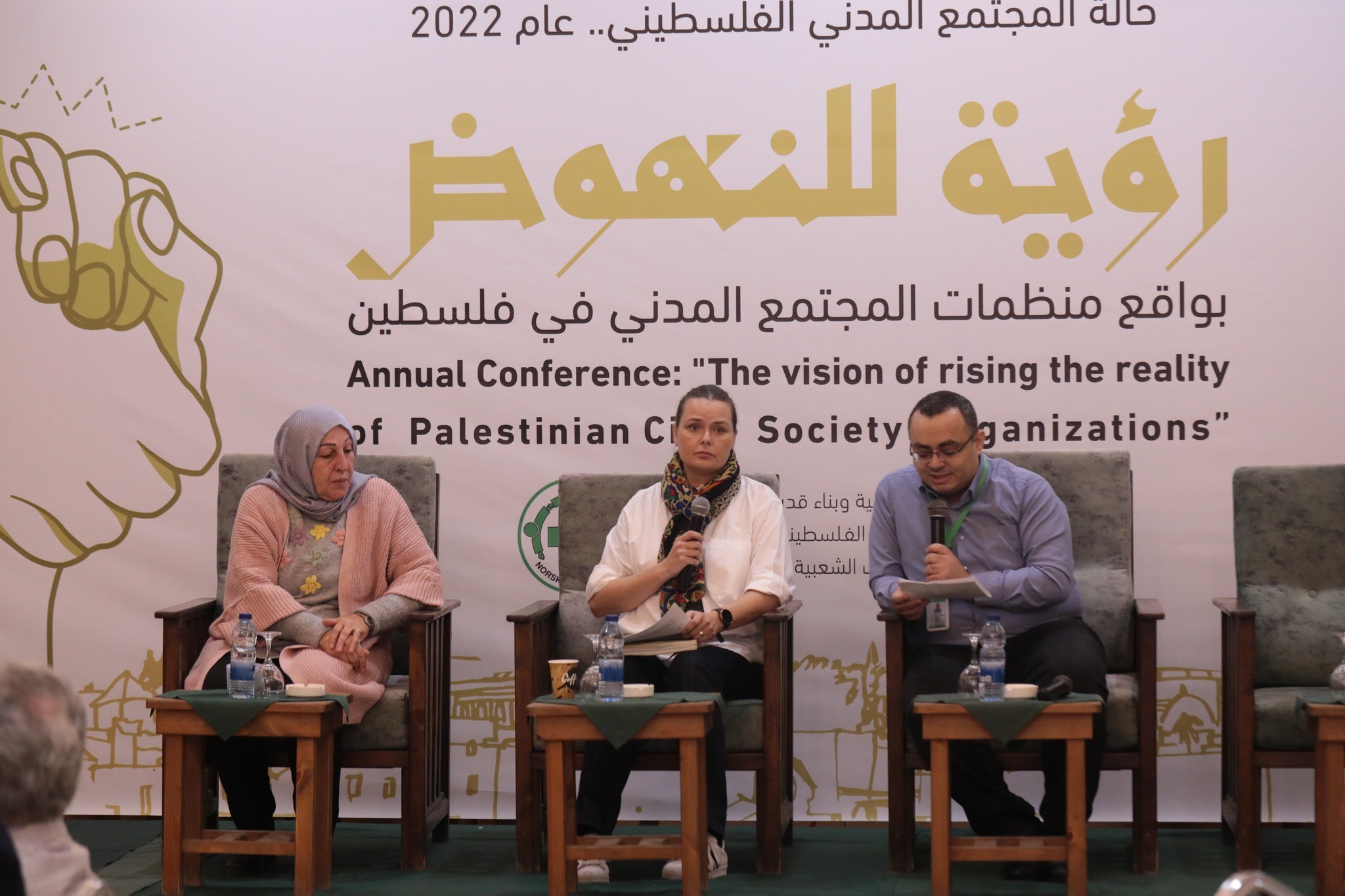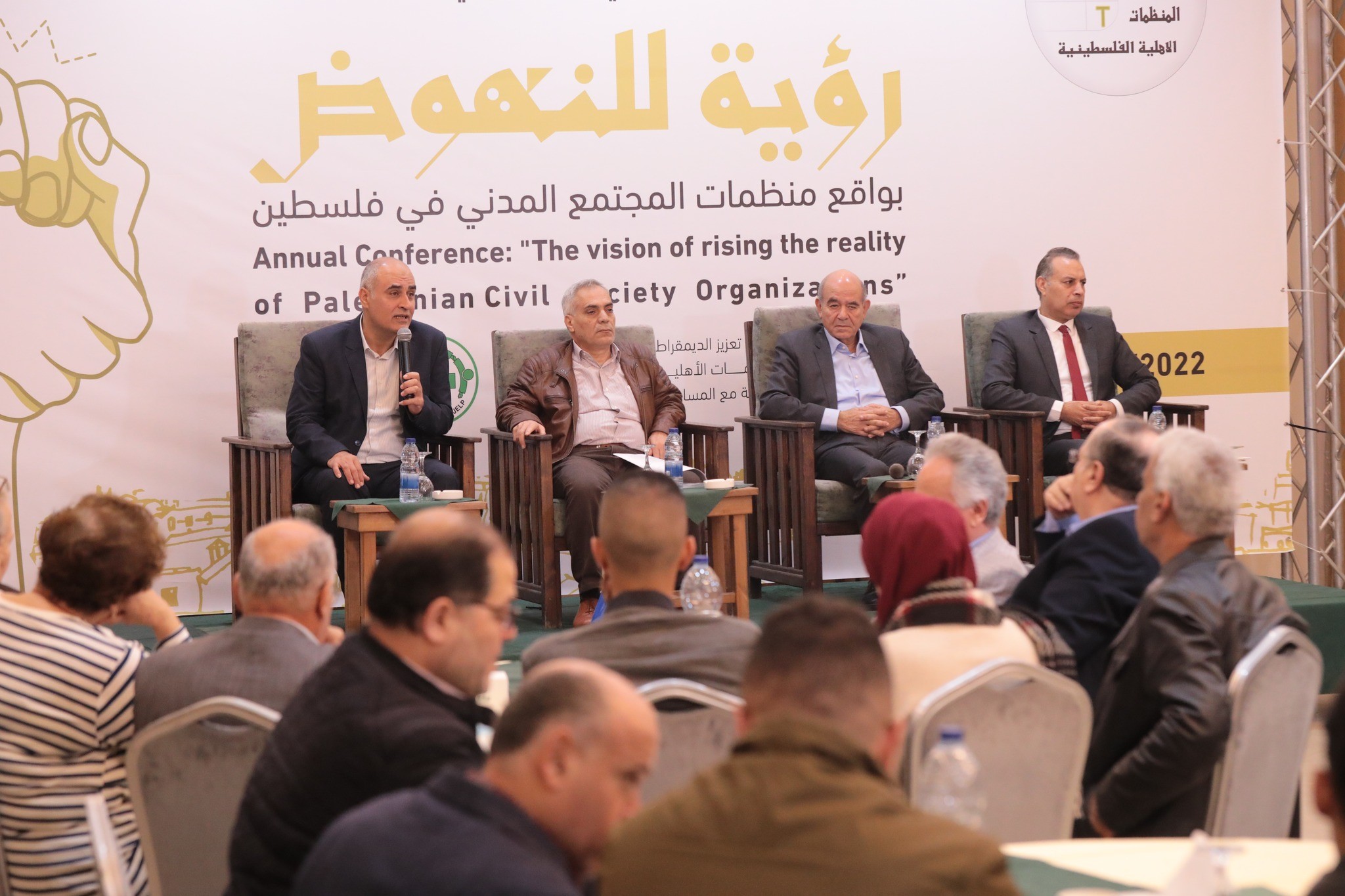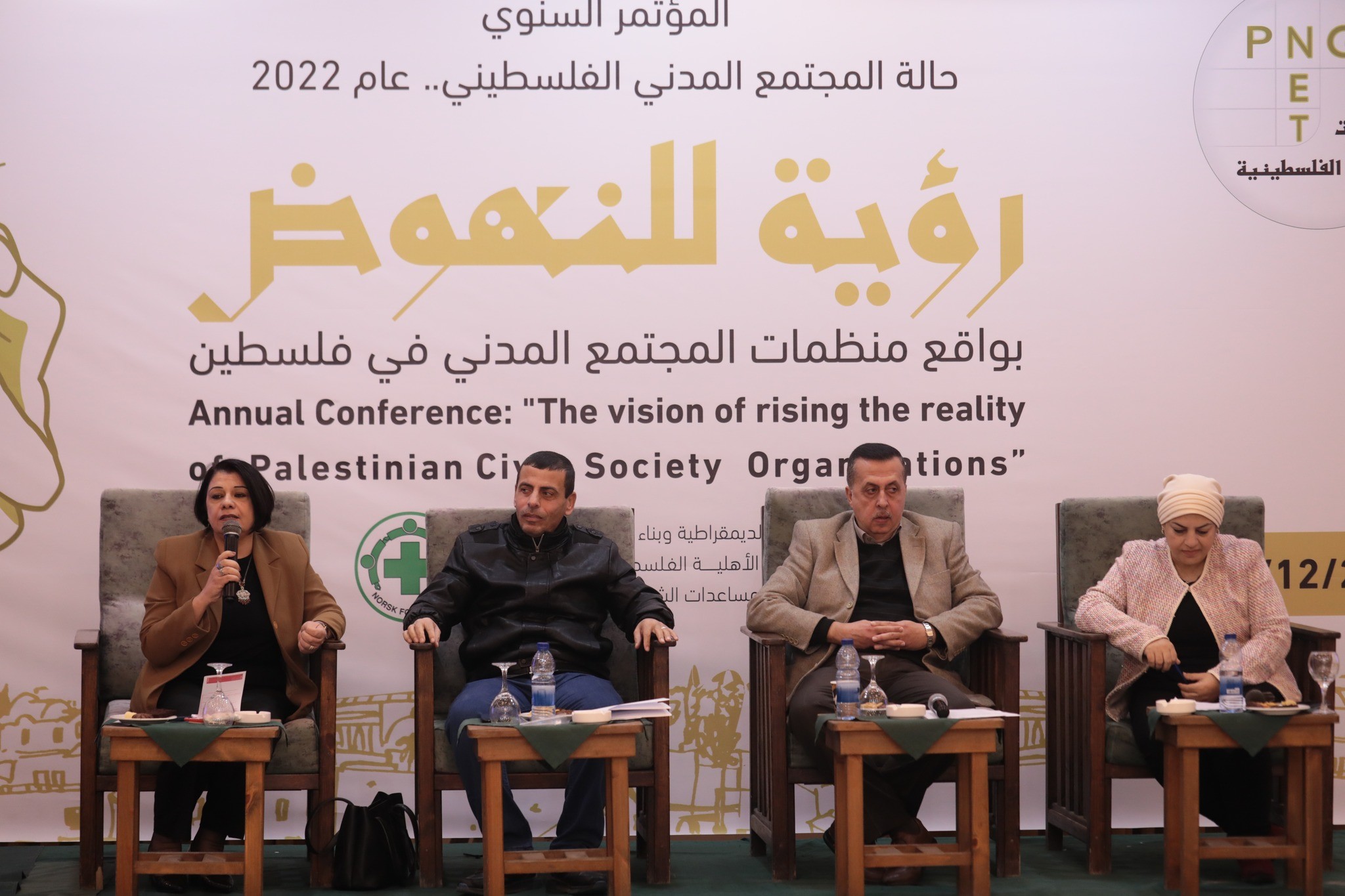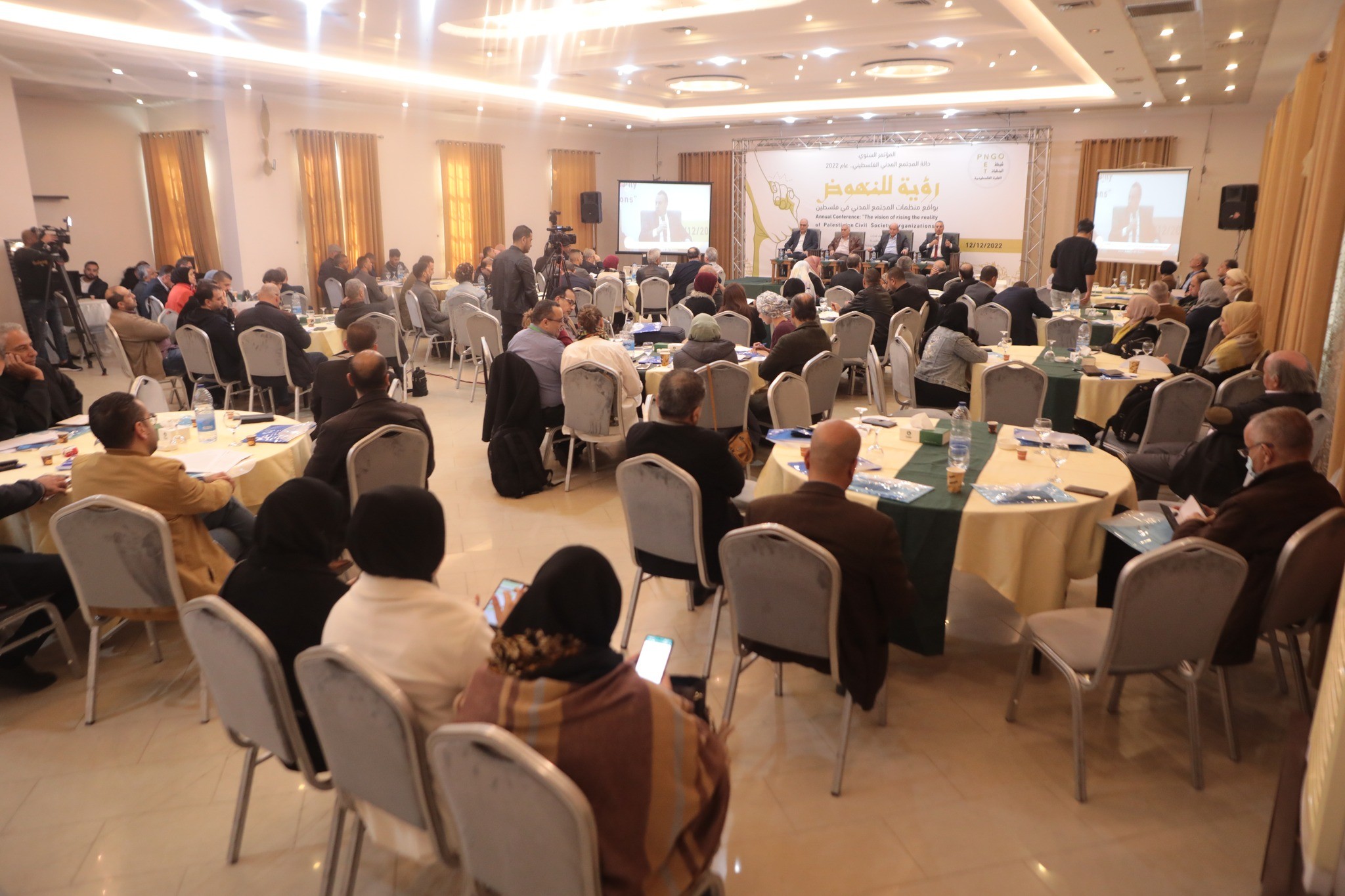Representatives of various Palestinian NGOs, human rights activists and experts, agreed that the Israeli occupation constitutes a main obstacle for the work of civil society organizations and the services provided by those NGOs for local residents, across the Palestinian territories.
They all believed that the restrictions imposed by the Israeli occupation are represented by a series of unfair measures and laws.
The aforementioned views came during an annual conference, held by the Palestinian NGOs Network (PNGO), at the Cidar Restaurant in Gaza City, in which PNGO presented an overview about the situation of Palestinian civil society for the year 2022, under the title "A vision of rising the reality of Palestinian civil society organizations". The conference was attended by a wide range of participants, including representatives of civil society organizations that work in various sectors.
Participants emphasized on the need for intensifying all possible efforts for the best of ending current Palestinian political split and reach national unity by means of tackling ramifications of the split at all levels, as well as reviving the Palestinian national cause as being a cause of justice under an occupation.
They also called for promoting the concept of steadfastness that is based on rights and embodying such a concept within civil society organizations by means of real partnership among all concerned parties and sectors including civil society organizations themselves, government-run institutions, international organizations and the private sector.
All such efforts should eventually lead to realization of the Palestinian people's rights, participants believed.
Regarding the occupation-carried out violations, participants called for supporting efforts by human rights groups, mainly documentation of those violations in a way that would allow submitting related reports to the international criminal court, with an emphasis on rejecting conditional political funding.
They also called for the respect of the right to freedom to assemble societies and lifting all restrictions imposed on the work of other civil societies, as well as the right to organize peaceful public gatherings.

PNGO's annual conference for the year was inaugurated by a speech by Mrs. Maryam Zaqout, member of PNGO's coordination committee.
Zaqout said that this year's conference comes against the backdrop of extremely hard conditions, with the occupation having committed more crimes, violating the Palestinian people's rights.
She pointed out that civil society organizations have been playing a significant role in resisting the occupation and raising the awareness of the public, spreading knowledge and building culture, reinforcing democracy and social participation, in addition to providing various service, far and wide.
Zaqout also asserted that civil society organizations have been making some more efforts to realize social, economic and political development,
She believed that the slowdown in both politics and economy is caused by the frequent Israeli attacks, the ongoing political split, the Israel-imposed siege of Gaza, lack of resources and frustration amongst the population, which all in turn have undermined democracy and transparency, as well as freedoms and human rights.
Zaqout called on civil society organizations to exert some more efforts for supporting the steadfastness of the Palestinian society, so that it will be able to face all existing and potential risks.
She also said that the occupation has constituted a key stumbling block for sustainable development, as the occupation has imposed restrictions on border crossings, via which various resources could have been brought.
She hinted at what she described as Palestinian economic subordination to the occupation, calling for ensuring a suitable environment that would help establish state-run institutions and reinforce the political will of decision makers, in a way that would allow them to end political division and revive the roles of both women and youth in politics.
Zaqout explained that the bad need for free development is mainly dependent on people and that once people's minds are liberated of external repression and hegemony, then tools for justice can be made available and people's steadfastness can be supported.
She believed that civil society organizations have a big responsibility to hold towards achieving such goals, calling for supporting the steadfastness of civil society organizations themselves.
From her part, Anja Riiser, Country Director of Norwegian People's Aid in Palestine (NPA), delivered a speech, in which she spoke of the challenges, faced by civil society organizations, including repressive measures when it comes to those societies' attempts to advocate certain causes, expressing criticism to certain issues or mishandling.
She added that the shrinking space of civil society organizations is apparently fueled by aggressive campaigns, carried out by the Israeli authorities and their supporters, in order to delegitimize civil society organizations.
She also hinted at the point that civil society organizations have turned victims of those restrictions.
Riiser made clear that among those restrictions, as well, are the occupation-carried out excessive administrative detention and physical harm and harassment against staff members of civil society organizations. In addition, she further noted, staff members are subject to restriction of both freedoms of movement and expression.
The occupation, according to Riiser, has been passing laws of its own, aimed at further imposing those restrictions and blocking funding received by civil society organizations.
She also spoke of what she described affected rule of law, human rights and equality between males and females, caused by restrictions on democracy. She said that transparency and accountability have been limited in either the public sector or with non-governmental service providers.

First Session: (Challenges and Restrictions)
First session of the conference, moderated by Amjad Shawa, director of PNGO, addressed challenges and restrictions, faced by civil society organizations.
Engineer Tayseer Mohaisen, director of the Agricultural Development Society, told participants that the civil society organizations have been subject to continued Israeli aggression and incitement, explaining that Israel has not only committed crimes against humanity but it has also chased and repressed those, who fight back Israel's apartheid regime or defend Palestinian human rights, either at the individual or institutional levels, mainly NGOs.
He pointed out that Israel has always targeted all those who oppose and uncover it's policies and actions, by means of repression, killing, chase and arrest. He further noted that Israel has particularly targeted those, who support the existence and steadfastness of all people on their lands, with the purpose of protecting and defending the national identity and human rights and bringing war criminals to justice.
He pointed out that the restrictions and obstacles, imposed by Israel, including restriction of movement, peaceful gatherings, physical harm, harassment and defamation, have all negatively affected legitimacy of civil society organizations.
He added that those restrictions have also impacted the abilities of civil society organizations to fundraise by means of imposing some restrictive legal procedures and policies that have aimed at tightening the organization's sources of funding.
In addition, Mohaisen addressed ramifications and consequences of Israeli assaults on civil society organizations, including reduction of funding and support and even cutting the funding off completely. He pointed out that Israeli authorities have also undermined the functioning of human rights institutions, silenced their voice and weakened their ability to serve their audience and meet the increase in service requests, and preventing the documentation of Israeli atrocities and the pursuit of accountability at the international level.
Mohaisen also spoke out of some other difficulties and challenges, facing NGOs, mainly the restraint to appeal against some military Israeli orders or decisions through Israeli legal channels. He cited those difficulties to what he described as 'secret evidences', a mechanism used by Israel against NGOs.
He recommended that there needs to be some lobbying towards reactivating some United Nations' mechanisms to fight apartheid or even creating a new mechanism that would do the same job, calling for detaching from the Oslo peace accords, which he described as an illusion.
He also believed that there needs to be some kind of change of the stereotype visions and objectives in terms of public and civil actions under a colonial rule.
Mohaisen urged all NGOs to assume their historical role in achieving an effective social development by means of establishing economic and social structures that would enable Palestinian men and women to own their destinies and resources.
He pointed out that the international community has a role to play in terms of exposing the apartheid/fascist facet of the occupation by means of collecting evidences about occupation-perpetrated crimes against humanity.
He emphasized on the need to build up a comprehensive national strategy that would reinforce the steadfastness of the Palestinian people, in the face of the occupation's policy of property confiscation. He believed that the occupation must be delegitimized by means of lobbying and legal actions at the international level.
Jamil Serhan, director of the Independent Commission for Human Rights in Gaza, highlighted most significant decisions, taken by local authorities in Gaza and the West Bank and had a negative impact on the civil society, throughout these territories.
He cited some human rights violations in both West Bank and Gaza, noting that those violations have been governed by policies that have reacted to certain actions, mainly.
Serhan asserted on the Palestinian people's right to live in dignity, in accordance with law and based on the respect of human rights.
The right group's chief called for nulling the non-profit companies law, considering this law as being unfair for the amount of restrictions it imposes on non-profit right institutions, including security check on board members of those institutions and imposition of certain fees on institutions that have nothing to do with applied laws.
From his part, Raji Sourani, director of the Palestinian Center for Human Rights in Gaza, hinted at what he termed regional and international transformations that he believed to have affected visions of civil society organizations, citing what he describe double-standard international community's handling of the Palestinian question, compared with the current Russia-Ukraine crisis.
Sourani believed that all crimes, which the international law has already defined, have been violated by the Israeli occupation, which still evades punishment.
He noted that the US and some other friendly country of which, have imposed seven unprecedented economic and political sanctions on Russia, while the Israeli occupation still faces no such sanctions.
He further explained that Palestinian civil society organizations agree that rights are non-negotiable and that the right to resist the Israel occupation is a sacred given right for every free Palestinian man or woman.
The veteran rights advocate also spoke of some efforts underway, taken by right groups in order to expose Israeli crimes against the Palestinian people, noting that the upcoming Israeli government could be the worst in Israeli occupation's history.
"We are not going to back down and we will continue our struggle for our cause of justice, meanwhile the internal political split must come to an end and Palestinian citizens must live in freedom and dignity", Sourani further noted

Second Session: Uplifting civil society organizations
The second session of the conference, moderated by Taghreed Jum'a, director of Palestinian Women Committees Union, addressed ways to uplift civil society organizations.
Researcher Ghassan Abu Hatab, spoke of the need for broader involvement by civil society organizations in terms of reinforcing steadfastness of the Palestinian people against Israeli occupation policies, which he believed to have undermined the capacities of civil society organizations and impeded implementation of their programs and in some cases have led to closure of certain societies.
He highlighted a number of challenges, faced by civil society organizations, especially vulnerable structural and professional infrastructures, less public participation, less transparency, less voluntary works, as well as less national developmental priorities.
He called for harmony between civil society organizations and the sustainable development plan for the year 2030, including principles of development.
He emphasized on the need for creating an overall Palestinian social mobility that would help restore national rights, reform national institutions and give priority to individual, social and economic rights.
Abu Hattab urged civil society organizations to form a broad demographic alliance that would help attain all basic national and individual rights.
He called for rethinking the concept of social protection, which has ever been confined to relief and donations, provided occasionally. In this respect, he called for thinking about creating a new empowerment sector that would help out most impoverished individuals on regular basis. To reach this goal, he called for reinforcing institutional structures of civil society organizations, so that they become more capable of facing whatever challenges.
Mohsen Abu Ramadan, director of Dr. Haidar Abdelshafi center for Culture and Democracy in Gaza city, gave a presentation over local voluntary initiatives that were the basis of civil society organizations, especially during the first Palestinian uprising or Intifada, back in 1987.
He further noted that following the installation of the Palestinian Authority in 1994, civil society organizations had become rather institutional and professional, working in various sectors and fields.
Abu Ramadan explained "when civil society organizations realized the post-Palestinian Authority era, in which structural tasks were integrated with national tasks, those organizations went for relief and developmental programs of their own to help most vulnerable individuals and categories of the society and lobby for fair relevant laws and legislations".
He pointed out that the calls by civil society organizations for good governance, corruption fighting in terms of public funds, promotion of freedom, democracy and human rights, including the right to expression and peaceful public gatherings, respect of partisan and syndicate pluralism , as well as promotion of elections, have been main concerns of civil society organizations, which aim at realizing transparency, accountability and electoral participation.
He added "civil society organizations have been exposed to many challenges, on top of which is the occupation. The occupation continues to monitor activities of civil society organizations and sometimes incited against them by accusing them of being anti-Semitic or linked with Palestinian resistance against the occupation. Recently, the occupation has accused seven Palestinian civil society organizations of supporting the resistance and called on international donor institutions to set forth certain political conditions for funding”.
In addition, Abu Ramadan pointed out that some international donor parties have pushed some civil society organizations to execute certain programs that are did not necessarily go with the basic developmental objectives of those organizations. In some cases, noted Abu Ramdan, the donors promoted civil society organizations to engage in projects that back normalization with the occupation.
Abu Ramadan spoke also of Palestinian political division ramifications on civil society organizations with no elections having taken place and a series of measures and laws been taken. Abu Ramadan noted that this situation has badly impacted the status of human rights and freedom of expression including the right to peaceful public gatherings.
He pointed out that centralized governance has been quite dangerous as it has helped rise of some political elites, who have been focused on their own interests and gains, at the expense of the public, especially impoverished and marginalized individuals.
He also made clear that majority of civil society organizations have been engaged in administering their own works and removing all possible obstacles, the latest of which was the law pertaining to non-profit firms that addresses fighting money laundry and terrorism.
Speaking of general elections, Abu Ramadan believed that once both the Palestinian legislative and national councils, in addition to the presidency go for elections, many laws and decisions should be taken and the political Palestinian spectrum should be reformed on democratic basis and in accordance with the law and independent jurisdiction.
He called for promoting mechanisms for monitoring, accountability and questioning, guaranteeing partnership, integrating the political spectrum and achieving social unity.
Wafa Alghosain, director of Teacher Creativity Center in the Gaza Strip, addressed engaging in partnerships, by which challenges can be faced. She emphasized on the point that local authorities should make sure that more social participation takes place in public life and that public policies, along with dialogue should be set for the best of enhancing multi-parties participation.
She pointed out that civil society organizations need to understand the significance of such participation and these organizations also need to possess some effective and efficient capacities to contribute to the nation building.
Alghosain also explained that partnership between civil society organizations and government-run institutions can be maintained at different levels, including official/organized and the opposite.
She called for setting up partnerships, through which relevant information can be exchanged for the best of sharing expertise, thoughts and experiences within a well-organized cooperation, for the sake of joint projects.
Alghosain asserted that any real partnership cannot make success, unless each party understands and trusts the role and tasks of the other. She emphasized on the need for freedom of expression in the society and the ability to reach out whatever information needed, in a time local authorities still exclusively owns information.


